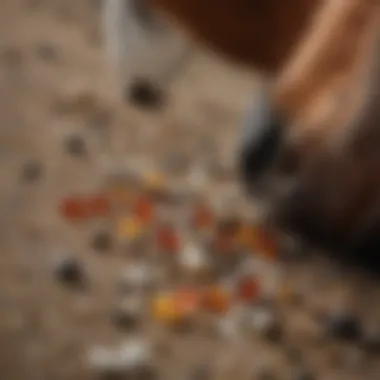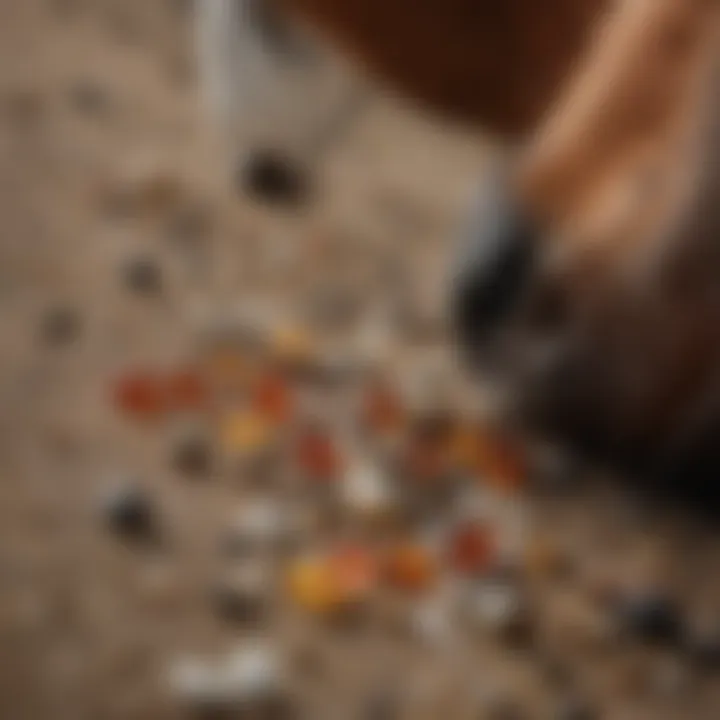The Best Dewormer for Horses: An In-Depth Analysis


Intro
Deworming horses is essential for their health. Horses can host various parasites that impact their well-being. Understanding dewormers is crucial for horse owners.
In this article, we will examine important aspects of equine deworming. We’ll explain the active ingredients, efficacy, and safety of leading dewormers. Additionally, we will discuss the importance of considering a horse's age, lifestyle, and geographic location when selecting a dewormer. The insights provided in this article are based on scientific research and expert opinions.
Animal Profile
General Overview
Horses are magnificent and diverse animals. They belong to the species Equus ferus caballus, a domesticated member of the horse family. Generally, horses can weigh between 900 to 2,200 pounds. They vary significantly in breeds, sizes, and colors.
Equines are prey animals with notable social structures. They are often found in herds, which allows them to experience natural behaviors and interactions. This social aspect is crucial for their mental health.
Habitat and Distribution
Domesticated horses are found globally, wherever humans have integrated them into their lives. They thrive in grassy plains, open fields, and stables. Horses require ample space to roam and graze, making their habitat essential for their overall health.
It is also important to note that different regions can influence the types of parasites horses encounter. For example, areas with high humidity may have different parasitic challenges compared to arid regions.
Fascinating Facts
Unique Traits and Adaptations
Horses have impressive speed, capable of reaching up to 55 miles per hour. Their sense of hearing and vision is also remarkably advanced, allowing them to detect potential threats quickly. This adaptability has aided in their survival as both wild and domesticated animals.
Historical and Cultural Significance
Throughout history, horses have played vital roles in human civilization. They have been used for transportation, work, and companionship. In many cultures, horses symbolize strength, freedom, and nobility.
Conservation Status
Current Population Trends
Horse populations vary widely across the globe. While some breeds are flourishing, others face decline and require conservation efforts. Tracking these trends helps us understand the impact of environmental changes and human activity on equine health.
Threats and Challenges
Horses face numerous threats, including habitat loss, neglect, and parasite infestations. These factors can hinder effective parasite management. Horse owners must prioritize these challenges when planning deworming strategies.
Care Tips for Pet Owners
Basic Needs and Requirements
To care for horses properly, owners must provide adequate shelter, food, and social interaction. Quality hay, fresh water, and regular veterinary check-ups are essential. Proper nutrition plays a significant role in a horse’s overall immunity and resistance to parasites.
Health and Wellness Tips
Routine deworming is a key component of responsible horse ownership. Owners should develop a deworming schedule that considers the horse's age, lifestyle, and geographical location. This tailored approach ensures horses maintain optimal health and minimize parasite-related issues.
Deworming is not just a seasonal task; it's an ongoing commitment to the horse's health.
Understanding Equine Parasites
Understanding equine parasites is fundamental to effective horse management. Parasites can significantly impact a horse's health and overall performance. Gaining insights into the various types of parasites that inhabit equines allows for informed decision-making regarding deworming strategies and lifestyle adjustments.
Types of Parasites Affecting Horses
Horses are susceptible to a range of parasites, broadly categorized into external and internal types. External parasites, such as ticks and lice, afflict the horse's skin and can lead to discomfort and secondary infections. Conversely, internal parasites primarily reside in the digestive tract, affecting the horse's ability to absorb nutrients. Common internal parasites include:
- Strongyles: This is a category of roundworms known to affect horses severely. They can cause colic and other digestive disorders.
- Ascarids: Also known as large roundworms, these are more common in younger horses and can result in respiratory issues and poor growth.
- Tapeworms: These flatworms can lead to blockages in the intestines, causing severe health problems if left untreated.
Recognizing the types of parasites is crucial for developing an effective deworming protocol. Understanding their life cycles and modes of transmission will help horse owners take proactive measures.
Signs of Parasite Infestation
Detecting a parasite infestation early is essential for the well-being of the horse. Awareness of the signs can aid in swift intervention. Here are some common indicators:
- Weight loss: A noticeable decrease in body weight despite a normal appetite may indicate a parasitic load.
- Poor coat condition: A dull, rough coat can be a signal of internal parasites, as they interfere with nutrient absorption.
- Colic: Frequent episodes of colic can suggest the presence of strongyles or other harmful internal parasites.
- Coughing: This may be associated with ascarids, which can migrate to the lungs.
It's important to monitor horses closely and consult a veterinarian if any signs of parasite infestation appear. Early detection is key to preventing serious health issues.
In summary, understanding equine parasites encompasses recognizing the types that affect horses and their associated signs. This knowledge aids in maintaining optimal equine health through proactive management and strategic deworming.


The Role of Dewormers in Equine Health
Dewormers play a critical role in maintaining the health and vitality of horses. While it may seem simple, the process of deworming is fundamental to preventing parasite infestations. Parasites can have serious impacts on a horse's health, leading not only to physical discomfort but also to more severe diseases.
Importance of Regular Deworming
Regular deworming is essential for several reasons. First, parasites, especially intestinal worms, can severely compromise a horse's health by robbing the animal of vital nutrients. These organisms consume the nutrients from the horse’s feed, leading to weight loss and poor overall health. According to veterinarians, maintaining a deworming schedule can help ensure that these parasites do not take a foothold in the horse's system.
Moreover, some parasites have the ability to multiply rapidly. Without regular deworming, a small infestation can quickly escalate into a full-blown issue, which might be much more challenging and costly to treat. In fact, many experts recommend deworming every six to eight weeks, depending on management practices, geographical location, and the horse's specific needs.
Regular deworming also contributes to overall herd health. If one horse is infested, it poses a risk to others, especially in group settings like stables or pastures. By adopting a proactive approach to deworming, horse owners can greatly reduce the risk of contagion and improve the health status of all horses in a given area.
Consequences of Neglecting Deworming
Neglecting a deworming routine can lead to a cascade of health problems. Horses infected with parasites are more prone to developing colic, a common and serious condition that affects the digestive system. This can lead to severe pain and may even require surgical intervention in extreme cases. Besides colic, horses can suffer from anemia, caused by blood-feeding parasites, resulting in lethargy and weakness.
The long-term consequences may also include decreased performance. Horses that are struggling with a heavy parasite load may exhibit reduced stamina, inability to concentrate, and overall diminished performance in training or competition.
“An untreated parasite infestation can lead to significant economic loss for horse owners, not to mention the distress experienced by the horses themselves.”
In addition, the potential development of resistance is a significant concern. Over time, some parasites develop a resistance to certain dewormers if they are used too frequently without rotation. This underscores the need for a strategic approach to deworming, taking into account the horse's needs and the medications available.
In summary, regular and effective deworming is paramount for maintaining equine health. It not only protects individual horses but also ensures the well-being of the entire herd. Moreover, a knowledgeable approach to deworming can prevent the development of resistance, prolonging the efficacy of available treatments.
Common Dewormers for Horses
Understanding common dewormers is critical for effective parasite management in horses. Each dewormer has distinct active ingredients aimed at targeting specific parasitic infections. Choosing the right one is not just a matter of following trends; it requires careful consideration of various factors, including the unique health needs of the horse, its living conditions, and geographical parasite risks. This section discusses several key dewormers widely used in equine care, analyzing their benefits and active ingredients to assist horse owners in making informed decisions.
Ivermectin-based Dewormers
Ivermectin is a widely recognized active ingredient in equine dewormers. It is effective against a broad range of internal and external parasites, including strongyles, ascarids, and bots. The mechanism of action involves the paralysis of parasites, leading to their expulsion from the horse's body.
Some prominent products that utilize ivermectin include:
- Zimecterin
- Equimax
- IverCare
Ivermectin's versatile nature makes it a popular choice for horse owners. However, it is paramount to adhere strictly to dosages recommended by veterinarians. Over-reliance on ivermectin can lead to the development of resistance among parasite populations, thus diminishing its effectiveness over time.
Fenbendazole Options
Fenbendazole is another important active ingredient available in various formulations for horse deworming. It works primarily against large strongyles and both adult and larval forms of small strongyles. This dewormer is particularly valued for its safety profile, making it suitable for pregnant mares and young foals.
Some products containing fenbendazole include:
- Panacur
- Safeguard
The dosing regimen for fenbendazole often involves a longer administration period compared to other options, typically lasting five days. This extended duration is crucial to ensure complete eradication of resistant larvae.
Praziquantel Formulations
Praziquantel is specifically utilized for targeting tapeworms. This type of parasite is often overlooked in equine deworming programs. Tapeworm infestations can lead to colic and other serious health issues in horses.
Products featuring praziquantel include:
- Quest Plus
- Equimax
The advantage of praziquantel is notable; its effectiveness against tapeworms differentiates it from many other dewormers. Due to the significant health risks posed by these parasites, integrating praziquantel into deworming protocols is wise, especially in regions where tapeworms are common.
Moxidectin Products
Moxidectin represents a newer class of dewormers for horses, showing promise in controlling both adult and larval stages of strongyles. Its prolonged efficacy period encourages less frequent applications compared to traditional dewormers, which can also minimize the chance of developing drug resistance.
Some known moxidectin products are:
- Quest
- Quest Gel
Moxidectin is particularly advantageous in populations where there is a known resistance to older drugs. However, implementing moxidectin should be done in consultation with veterinarians to ensure proper use and timing.
Understanding these common dewormers enables horse owners to create tailored and effective deworming strategies. It is crucial to keep abreast of the latest research on the efficacy and safety of these products, ensuring the utmost care for equine health.
Selecting the Best Dewormer
Selecting the appropriate dewormer for horses is pivotal in ensuring their overall health and well-being. With a myriad of options available on the market, horse owners must consider various factors to make an informed decision. Each horse has unique needs influenced by age, health status, and lifestyle. Therefore, tailoring deworming protocols can significantly enhance efficacy and safeguard against parasite resistance, an increasing concern in equine health management.


Age and Health Considerations
The age of the horse plays a critical role in determining the suitable dewormer. Young horses, particularly foals and yearlings, are more susceptible to parasites due to their developing immune systems. They often require specific deworming agents to combat common gastrointestinal nematodes effectively. For instance, fenbendazole is frequently used for its efficacy against various larval stages.
On the other hand, older horses may have underlying health issues that complicate the deworming process. They may not tolerate certain medications as well as younger horses. Moreover, horses with compromised health, such as those suffering from liver disease or other chronic conditions, require a cautious approach to deworming. It is essential to assess the health status of the horse before selecting a dewormer. Veterinarians can provide valuable insights into which products are appropriate based on comprehensive health evaluations.
Lifestyle and Activity Level
The lifestyle and activity level of a horse also dictate deworming strategy. Horses that spend time in a pasture are likely to have a higher exposure to parasites compared to those that are stabled. Consequently, they may require more frequent deworming or stronger agents to manage infestations.
Working horses or those involved in heavy training can also face different challenges. Higher levels of stress and physical exertion can impact the immune response, making them more susceptible to parasitic infections. In such cases, selecting a dewormer that aligns with their lifestyle will be crucial in maintaining their health. Regular fecal examinations can assist in making tailored decisions regarding dewormer selection.
Identifying dewormers that suit both the age and lifestyle of a horse is essential for effective parasite control.
In summary, selecting the best dewormer involves careful consideration of both age and health factors, as well as lifestyle and activity levels. Understanding these elements will guide horse owners in making informed choices that foster the well-being of their equine companions. By taking these factors into account, owners can enhance the effectiveness of their deworming protocols and contribute to their horse’s long-term vitality.
Regional Considerations for Deworming
Understanding the geographic and environmental contexts in which a horse resides is essential for effective deworming. The variations in parasite populations across different regions affect the approach horse owners should take. It is not enough to rely on general deworming practices; instead, one must consider local factors that may influence parasite prevalence and treatment efficacy.
Geographical Parasite Variations
Parasite species that infest horses can differ significantly based on their geographical location. For instance, Strongylus vulgaris, a common equine parasite, might be more prevalent in wet, temperate regions than in arid climates. In some areas, Bots may also flourish where climate conditions favor their lifecycle.
This regional variance calls for tailored deworming strategies. Horse owners should gather data on local parasite prevalence through veterinary services and agricultural extensions. Additionally, state or region-wide parasite surveys can provide valuable insight into which parasites are most likely to affect local equines.
Local guidelines often recommend specific dewormers for particular regions. In certain areas, resistant populations of parasites may emerge, necessitating a reevaluation of the chosen deworming methods. Keeping abreast of these trends is crucial for managing equine health effectively.
Environmental Factors Affecting Deworming Efficacy
Environmental factors play a pivotal role in the success of deworming protocols. Climate, soil type, and even agricultural practices affect the life cycles of parasites. For example, warmer climates can enhance the survival rates of larvae, leading to increased risk of infestation.
Some other key environmental influences include:
- Moisture Levels: High humidity and wet conditions often favor the proliferation of certain parasites.
- Pasture Management: Overgrazing can lead to a higher concentration of parasites in pasture land.
- Seasonality: Different seasons may affect parasite visibility and the success rate of treatments.
After treatment, the environmental context should be evaluated. For instance, it is recommended to wait at least two weeks before turning horses back onto treated pastures, allowing time for any remaining parasites to die off.
Regional considerations for deworming are not merely about following generic guidelines; they demand a comprehensive understanding of local conditions, which ensures the effectiveness of your deworming strategy.
Deworming Protocols
Deworming protocols are essential for effective parasite management in horses. Having a structured approach to deworming ensures that you minimize the risk of infestations and maintain your horse's overall health. These protocols are not just about administering medication; they require a balance of timing, frequency, and methodology to yield optimal results. The primary benefits include improved health outcomes, reduced parasite resistance, and the promotion of a healthier equine environment.
Establishing a Deworming Schedule
Creating a deworming schedule is vital. It helps in pinpointing when and how to treat your horse effectively. A well-structured schedule considers the lifecycle of parasites and any seasonal variations. Traditionally, deworming is done every 6 to 12 weeks, depending on several factors, such as the horse's age, health status, and environmental conditions.
- Consultation with a veterinarian is crucial, as they can provide tailored recommendations based on the unique needs of your horse.
- Seasonal adjustments may be necessary. For example, certain parasites are more active during warmer months while others thrive in colder weather.
- Monitoring fecal egg counts helps in determining the right timing and efficacy of the chosen dewormers. This practice optimizes the schedule, ensuring that you administer treatments only when necessary.
A consistent schedule not only helps in keeping horses parasite-free but also contributes to overall herd health by preventing potential outbreaks.
Integrating Rotational Deworming Practices
Rotational deworming is another effective strategy in managing equine parasites. This method involves alternating between different types of dewormers to combat resistance issues. By rotating between active ingredients, the likelihood of parasites developing resistance to a particular formula is reduced.
Some essential aspects of rotational deworming include:
- Diversification of active chemicals. Using dewormers with different modes of action targets a broader spectrum of parasites, enhancing control.
- Establishing a consistent rotation schedule. Owners can plan their deworming practices based on the life cycle of specific parasites and the seasons. This prevents gaps in treatment and ensures that horses are protected all year round.
- Educating oneself on available formulations and their efficacy. Understanding how each dewormer works aids in making informed decisions.
Implementing a rotational deworming strategy can be a proactive measure in parasite control, leading to a more resilient equine population.
Effective deworming protocols contribute to reducing the overall parasite load in horses, promoting healthier environments for both the animals and the farmland.
Safety and Side Effects of Dewormers
Dewormers play a crucial role in maintaining the health of horses, but understanding the safety and potential side effects is essential. A well-informed approach to deworming not only protects the horse from parasites but also minimizes the risks associated with pharmaceutical treatments. Being aware of the possible adverse reactions and the influencing factors can help horse owners make informed decisions.
Potential Adverse Reactions
While dewormers are generally considered safe, some horses may experience adverse reactions. These reactions can range from mild to severe and may include:
- Allergic reactions: Some horses may develop allergies to active ingredients, leading to symptoms such as hives, swelling, or respiratory distress.
- Gastrointestinal upset: Nausea, vomiting, and diarrhea may occur. This can be uncomfortable for the horse and may lead to dehydration if not treated promptly.
- Neurological effects: In rare cases, certain dewormers can cause neurological symptoms, including tremors or uncoordinated movements. This is particularly concerning with Ivermectin in cases of overdose.
- Dermal reactions: Localized irritation or rashes can arise from topical applications in sensitive horses.


Monitoring the horse after administration is advisable. Knowing the specific side effects associated with the chosen dewormer can aid in timely management should any issues arise.
Factors Influencing Drug Reactions
Several factors can influence how a horse reacts to a dewormer, including:
- Age: Young or old horses may metabolize drugs differently. Foals and elderly horses are often more susceptible to side effects due to their developing or declining health status.
- Health status: Pre-existing health conditions, such as liver or kidney issues, can affect the breakdown and excretion of dewormers, increasing the chance of adverse effects.
- Breed and genetic factors: Some breeds may be more prone to specific adverse reactions based on their genetic predispositions. Understanding these nuances can help tailor approaches to individual horses.
- Environmental factors: Stressors like travel or changes in diet can influence how well a horse responds to treatment. A stressed or compromised animal may have a heightened risk of side effects.
Overall, it is vital for horse owners to consult with veterinarians prior to administering dewormers. Individualized advice based on the horse's health, age, and lifestyle can help mitigate risks and enhance welfare.
Important Note: Always observe the horse after administering any medication and report unusual symptoms to a veterinarian promptly.
Consulting with a Veterinarian
Consulting with a veterinarian is a crucial step in responsible horse ownership. Veterinarians possess specialized knowledge about equine health and can offer insights that may not be readily available to horse owners. Their guidance is particularly helpful in determining the right deworming strategy tailored for individual horses.
A veterinarian can evaluate a horse's health and lifestyle, which aids in selecting the most appropriate dewormer. They assess factors such as age, existing health conditions, and exposure to environmental risks. This personalized approach ensures that the chosen dewormer is effective and safe for the specific needs of the horse.
Moreover, professional veterinary advice helps owners stay updated on the latest findings concerning equine deworming. As research evolves, so do the recommended practices for managing parasites in horses. Therefore, consulting a veterinarian can provide invaluable information about safe practices, new products, and the significance of rotational deworming.
Consulting a veterinarian helps owners make informed decisions about deworming, ensuring better health outcomes for their horses.
When to Seek Professional Advice
Horse owners should consider seeking veterinary advice under several circumstances. If a horse is displaying unexpected or concerning symptoms—such as weight loss, changes in appetite, or abnormal behavior—a vet's assessment is essential. These signs can hint at possible parasitic infestations or other health issues that need addressing.
Additionally, it is advisable to consult a veterinarian when creating a deworming schedule, especially for young or elderly horses. The needs of these animals can differ significantly from healthy adults. Regular health check-ups can also help in assessing the effectiveness of existing deworming strategies and making necessary adjustments.
It's best to remember that each horse is unique. Consequently, a one-size-fits-all approach is inadequate when it comes to deworming protocols. Veterinary expertise ensures horse owners implement tailored solutions for their animals’ well-being.
Veterinary Recommendations for Deworming
Veterinarians often recommend a strategic approach to deworming that considers the individualhorse’s health status. They frequently suggest a fecal egg count test to determine the level of parasite infestation. This test identifies the need for deworming and verifies which type of dewormer, if any, is most suitable for use.
In addition, veterinarians may recommend specific dewormers based on the prevalent parasites in a given region. For example, in areas with high resistance to certain dewormers, alternative agents might be needed. They also emphasize the importance of maintaining a deworming schedule aligned with the horse's lifestyle, including whether it is stabled or kept in pasture.
Overall, establishing an effective deworming program should involve veterinary input. This collaboration not only optimizes the health of the horse but also helps mitigate the development of drug resistance over time. Following veterinary recommendations ensures that the horse receives the best care possible in relation to parasite management.
Recent Trends in Deworming Practices
Understanding recent trends in deworming practices is crucial for optimizing equine health. Given the evolving landscape of parasites and their resistance to traditional dewormers, it has become essential for horse owners to stay informed. This section highlights significant shifts in deworming strategies that prioritize both efficacy and safety. Focusing on recent findings ensures that horse owners can make informed decisions to protect their animals from parasite infestations.
Emerging Research on Deworming Resistance
Recent studies indicate a growing concern regarding deworming resistance. Parasites, like Strongylus vulgaris and others, have demonstrated an increasing ability to withstand conventional deworming treatments. This resistance complicates the management of equine parasites, making it imperative that we adapt our strategies.
Several key points emerge from ongoing research:
- Increased Monitoring: Regular fecal egg counts can help monitor resistance patterns. Identifying resistance early allows for more effective action.
- Rotational Deworming: Some studies suggest this practice can reduce resistance development. By alternating between different classes of dewormers, horse owners can help prevent parasites from adapting.
- Targeted Treatments: Instead of blanket deworming, targeted treatments based on fecal analysis can be more effective. By only treating as necessary, we minimize the risks associated with overuse of medications.
Such approaches highlight the importance of adapting our deworming protocols to ensure long-term efficacy.
Innovative Deworming Solutions
As the scientific community tackles deworming resistance, innovative solutions are emerging. These alternatives enhance deworming efficacy and can also contribute to parasite management sustainably. The following innovations show promise in changing the landscape of equine deworming:
- Natural Products: Some horse owners are exploring herbal and natural alternatives as adjunctive treatments. Ingredients like diatomaceous earth have been discussed for potential benefits, albeit with mixed evidence.
- Smart Dosing Technology: Advancements in technology have made it feasible to develop devices that can precisely dose dewormers, ensuring that each horse receives an appropriate amount while reducing waste and overdose risks.
- Genetic Research: Ongoing studies are looking into the genetic basis of parasite resistance. By understanding these traits, breeding programs may one day facilitate the development of horses that naturally resist specific parasites.
These innovative approaches can provide horse owners with tools to combat resistance effectively while considering the well-being of their equines.
In summary, staying abreast of recent trends in deworming practices equips horse owners with knowledge to implement effective strategies. Emphasizing research on resistance and exploring new solutions can foster healthier equine populations.
Epilogue
The conclusion of this article brings together the numerous threads of information explored regarding equine deworming. It emphasizes that understanding the right dewormer is crucial for maintaining optimal health in horses. By familiarizing oneself with the types of dewormers available and their specific applications, horse owners can make informed decisions tailored to their animal's needs.
Recapitulating Key Insights on Deworming
Throughout the article, several key takeaways have emerged:
- Deworming is essential for preventing parasite-related health issues.
- Regular schedules can significantly improve efficacy, aligning treatment with the horse's life cycle and environmental factors.
- Different active ingredients address various parasites, underlining the importance of selecting the right dewormer for the specific equine population.
- Consultation with a veterinarian offers personalized insights, strengthening the effectiveness of the deworming protocol.
All these insights contribute to a more informed approach in horse care, enhancing overall wellness in equines.
Future Considerations in Equine Deworming
Looking ahead, the landscape of equine deworming continues to evolve due to several factors:
- Research into resistance against common deworming agents is gaining momentum. Recognizing this resistance is vital for adjusting deworming strategies appropriately.
- Innovative practices such as rotational deworming and targeted treatments are becoming more popular, which may help mitigate resistance issues.
- Increased emphasis on individual horse management, factoring in age, environment, and specific health conditions, will guide future deworming efforts.
By keeping abreast of these advancements, horse owners can ensure they are equipped to combat parasites effectively while preserving the health and wellbeing of their horses.















